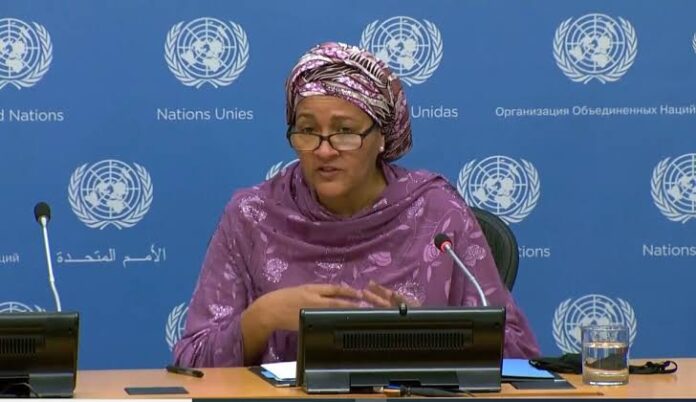Sub-Saharan Africa now accounts for nearly 59 percent of terrorism-related deaths globally in spite of the continued efforts by member states to end it, UN Deputy Secretary-General, Amina Mohammed, has said.
She made this known on Tuesday during a UN Security Council meeting on the maintenance of international peace and security.
The discussion had as theme,” African-led and development-focused counter-terrorism: Strengthening African leadership and implementation of counter-terrorism initiatives.”
According to Mohammed, for three years, terrorism related deaths have soared past 6,000 making up more than half of all global fertilities.
She said Burkina Faso now leads the world in terrorism deaths with a staggering 68 percent increase and with little support to reverse the trend.
“Africa has tragically remained the epicenter of global terrorism. In all its forms and manifestations, terrorism is the most significant threat to peace, security and sustainable development across the continent today.”
The impact of terrorism on women and families is particularly devastating, she noted.
According to her, terrorists frequently exploit and brutalise women through sexual and gender-based violence, including forced marriages and abductions, causing profound trauma that reverberates through entire communities.
She said terrorist networks are now pooling resources, finances, fighters and expertise, while sharpening their capabilities of new technologies, including unmanned aerial systems.
“Countering terrorism must continue to innovate with an approach that holds the respect for human rights and the rule of law at its core and an outcome that addresses the conditions conducive to its spread.
“African member states, with the full backing of the international community, must forge cohesive and conducted responses grounded in humanitarian development, peace nexus which align with the guiding principles of the global counter terrorism strategy.”
She said the pact for the future, agreed in September 2024 by UN member states, gives a renewed momentum to global efforts against terrorism, adding that now is the time to implement promises made in the pact with determined action.
The deputy secretary-general highlighted three priority areas with the first being the need to continually address the drivers of terrorism.
She said terrorism thrives on fragility and feeds off poverty, inequality and disillusionment.
“When financing development regresses, when fragile institutions are matched with weak governance and when women and youths are excluded from decision making, when public services are scarce or unequal, these conditions create fertile ground for radicalisation and recruitment.
“Building inclusive, resilient and sustainable societies must be our goal and we have a roadmap to get there. The 2030 Agenda, and in Africa, the 2063 Agenda need to be implemented.
She noted that human rights based approaches to counter terrorism grounded in accountable and inclusive institutions are needed.
She said regional cooperation is the linchpin of any effective counter terrorism strategy, adding that fragmenting efforts would serve perpetrators.
“Our response must be united, coherent and urgent, focused on fostering dialogue, trust and coordinated action.
“The African Union and its counterterrorism center have a leading role to play, but we must go further.
“Above all, we must ensure that regional efforts are in lock step, unified in purpose and aligned with the strategy.
“This is the only way we believe that we can ensure phasing down the threat of terrorism together.
“Ultimately, African led and African owned solutions must take the lead in tackling terrorism across the continent,” she said. NAN





